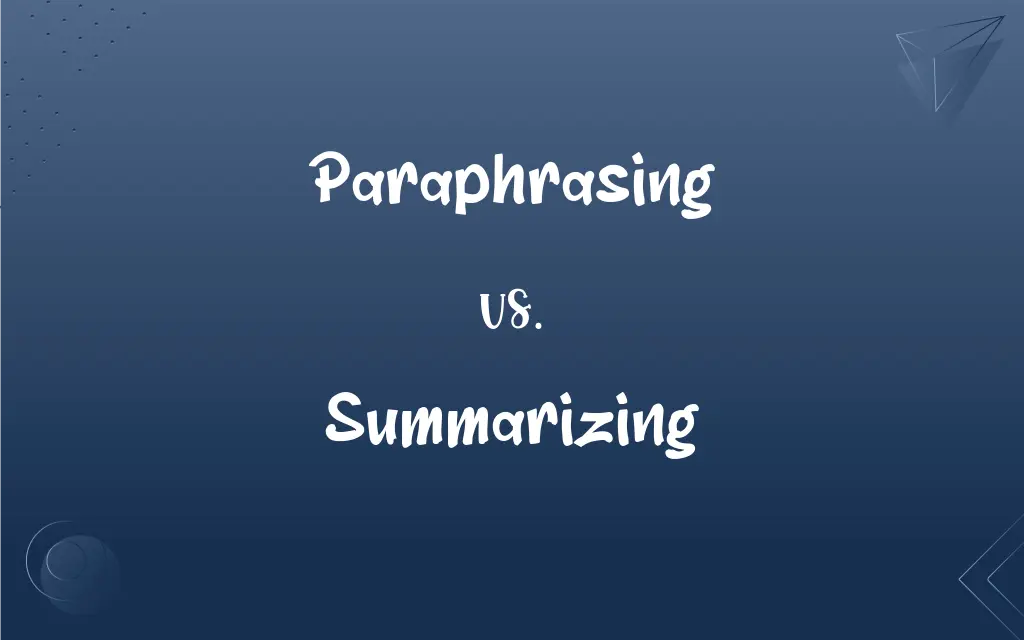Paraphrasing vs. Summarizing: What's the Difference?
Edited by Aimie Carlson || By Janet White || Published on January 28, 2024
Paraphrasing involves rephrasing text while maintaining its original meaning, while summarizing involves condensing the main ideas into a shorter form.

Key Differences
Paraphrasing is the process of restating text using different words and structure without altering the original meaning, requiring a deep understanding of the original text. Summarizing, on the other hand, involves distilling the essential points of a text into a concise form, often significantly shorter than the original.
In paraphrasing, the goal is to create a new version of the text that reflects the same ideas as the original, ideal for clarity or stylistic variation. Summarizing aims to provide an overview or abstract of the main points, useful for quick comprehension or reference.
Paraphrasing, one must closely follow the original text's meaning and context, often resulting in a similar length as the original. Summarizing requires identifying and extracting key points, leading to a much shorter version than the original text.
Paraphrasing is often used to avoid plagiarism by restating information in a new form while acknowledging the original source. Summarizing is effective in providing an overview or synopsis, particularly in academic or professional settings where brevity is essential.
Paraphrasing demands careful word choice and sentence restructuring, keeping the essence of the original intact. Summarizing involves the skill of distilling complex ideas into their core messages, often necessitating the omission of specific details or examples.
ADVERTISEMENT
Comparison Chart
Purpose
To restate text with different wording
To condense the main ideas into a brief format
Length
Similar to the original text
Significantly shorter than the original text
Focus
On maintaining the original meaning in new words
On extracting key points or themes
Usage
For clarity, stylistic variation, or plagiarism avoidance
For quick understanding, overviews, or abstracts
Process
Involves changing words and sentence structure
Involves identifying and extracting central ideas
ADVERTISEMENT
Paraphrasing and Summarizing Definitions
Paraphrasing
Rephrasing another's ideas without changing the intent.
In her essay, she paraphrased the philosopher’s complex theories.
Summarizing
Presenting the essence of a text succinctly.
The executive summarized his speech in a few sentences.
Paraphrasing
Rewriting text in new words while preserving original meaning.
He paraphrased the poem to make it easier for children to understand.
Summarizing
Distilling the key ideas of a larger text into a concise form.
He summarized the novel’s plot in one paragraph.
Paraphrasing
Restating content with different vocabulary and structure.
The student paraphrased the historical text for his assignment.
Summarizing
Condensing the main points of a text into a brief overview.
She summarized the report in a two-page document.
Paraphrasing
The act of expressing the same message in different wording.
Her paraphrasing of the technical manual made it more accessible to laypeople.
Summarizing
Creating a brief synopsis of a detailed text.
She summarized the research findings in her presentation.
Paraphrasing
Rewriting original material in a new form.
He paraphrased the legal document for clarity.
Summarizing
Providing a shortened version of the main arguments or themes.
The teacher summarized the lesson’s key points at the end of the class.
Paraphrasing
A restatement of a text or passage in another form or other words, often to clarify meaning.
Summarizing
To make a summary or make a summary of.
Paraphrasing
The restatement of texts in other words as a studying or teaching device.
Summarizing
Present participle of summarize
Paraphrasing
The adaptation or alteration of a text or quotation to serve a different purpose from that of the original.
Paraphrasing
To restate using different words, especially to clarify.
Paraphrasing
To adapt or alter (a text or quotation) to serve a different purpose from that of the original
"It's tempting to paraphrase an environmental slogan and say, 'Think globally, pray locally'" (Christian Science Monitor).
Paraphrasing
To compose a paraphrase.
Paraphrasing
Present participle of paraphrase
Paraphrasing
A paraphrased statement.
FAQs
What is summarizing?
It involves condensing the main ideas of a text into a shorter, concise form.
When is summarizing useful?
When you need to present the main points of a long text briefly.
How long is a paraphrased text compared to the original?
It's usually similar in length to the original text.
When should I paraphrase?
When you need to restate information in a different way while maintaining its original meaning.
Does paraphrasing change the original meaning?
No, paraphrasing should keep the original meaning unchanged.
How much shorter is a summary compared to the original text?
A summary is significantly shorter, often just a fraction of the original length.
What is paraphrasing?
It's rewriting text in new words while keeping the original meaning intact.
Does summarizing include all details of the original text?
No, it focuses only on the key points, omitting specific details.
Is summarizing good for quick reviews?
Yes, it provides a quick overview of the main ideas.
How does one ensure accurate paraphrasing?
By thoroughly understanding the original text and using different words and sentence structures.
Can paraphrasing be used in legal or technical documents?
Yes, for clarity and better understanding, while maintaining the original meaning.
Is summarizing beneficial in business settings?
Yes, for concise communication of important points.
How do paraphrasing and summarizing differ in terms of skill?
Paraphrasing requires skill in vocabulary and sentence restructuring, while summarizing requires the ability to identify and condense key points.
Can paraphrasing help in understanding complex texts?
Yes, by rephrasing, complex ideas can be made more comprehensible.
Is it necessary to cite sources when paraphrasing?
Yes, you should always cite the original source when paraphrasing.
Is summarizing useful in academic writing?
Yes, for providing overviews or abstracts of texts.
Can both paraphrasing and summarizing be subjective?
Yes, both can be influenced by the interpreter's understanding and perspective.
Do summaries need citations?
Yes, if the summarized content is not common knowledge.
Can paraphrasing be used to avoid plagiarism?
Yes, when done correctly and with proper citation.
What are the key elements to focus on when summarizing?
The main ideas, arguments, or themes of the original text.
About Author
Written by
Janet WhiteJanet White has been an esteemed writer and blogger for Difference Wiki. Holding a Master's degree in Science and Medical Journalism from the prestigious Boston University, she has consistently demonstrated her expertise and passion for her field. When she's not immersed in her work, Janet relishes her time exercising, delving into a good book, and cherishing moments with friends and family.
Edited by
Aimie CarlsonAimie Carlson, holding a master's degree in English literature, is a fervent English language enthusiast. She lends her writing talents to Difference Wiki, a prominent website that specializes in comparisons, offering readers insightful analyses that both captivate and inform.






































































